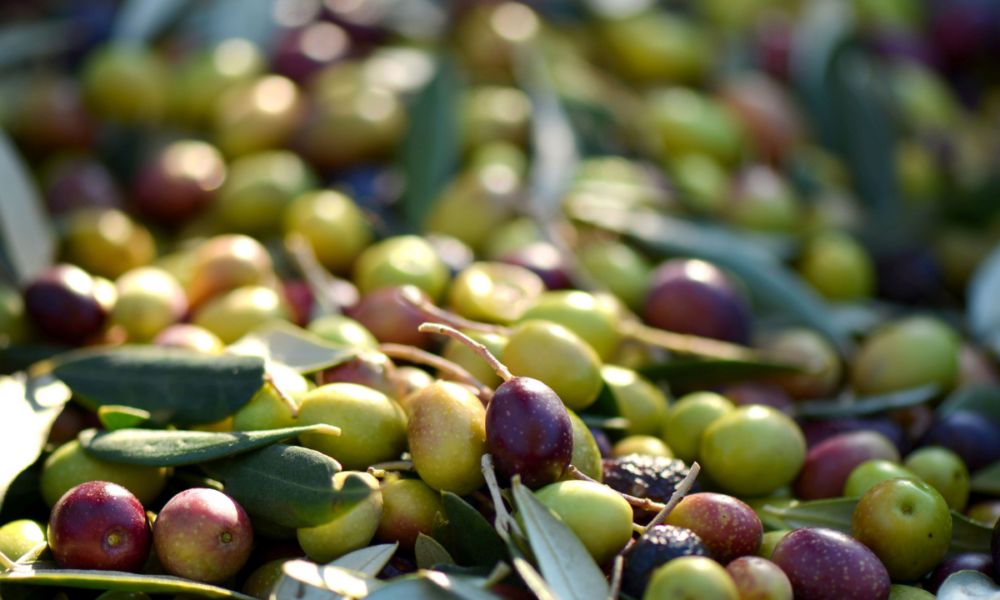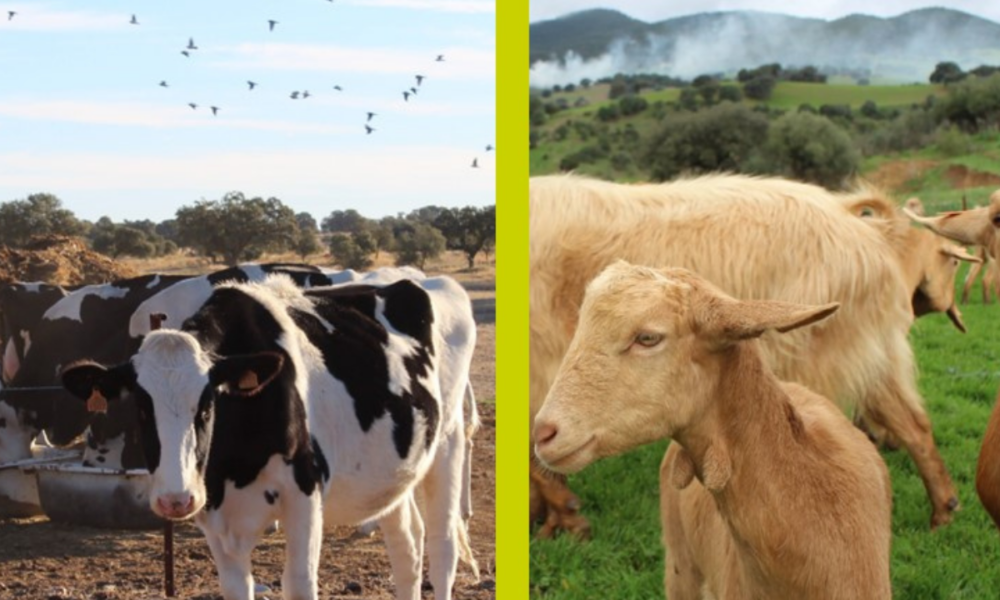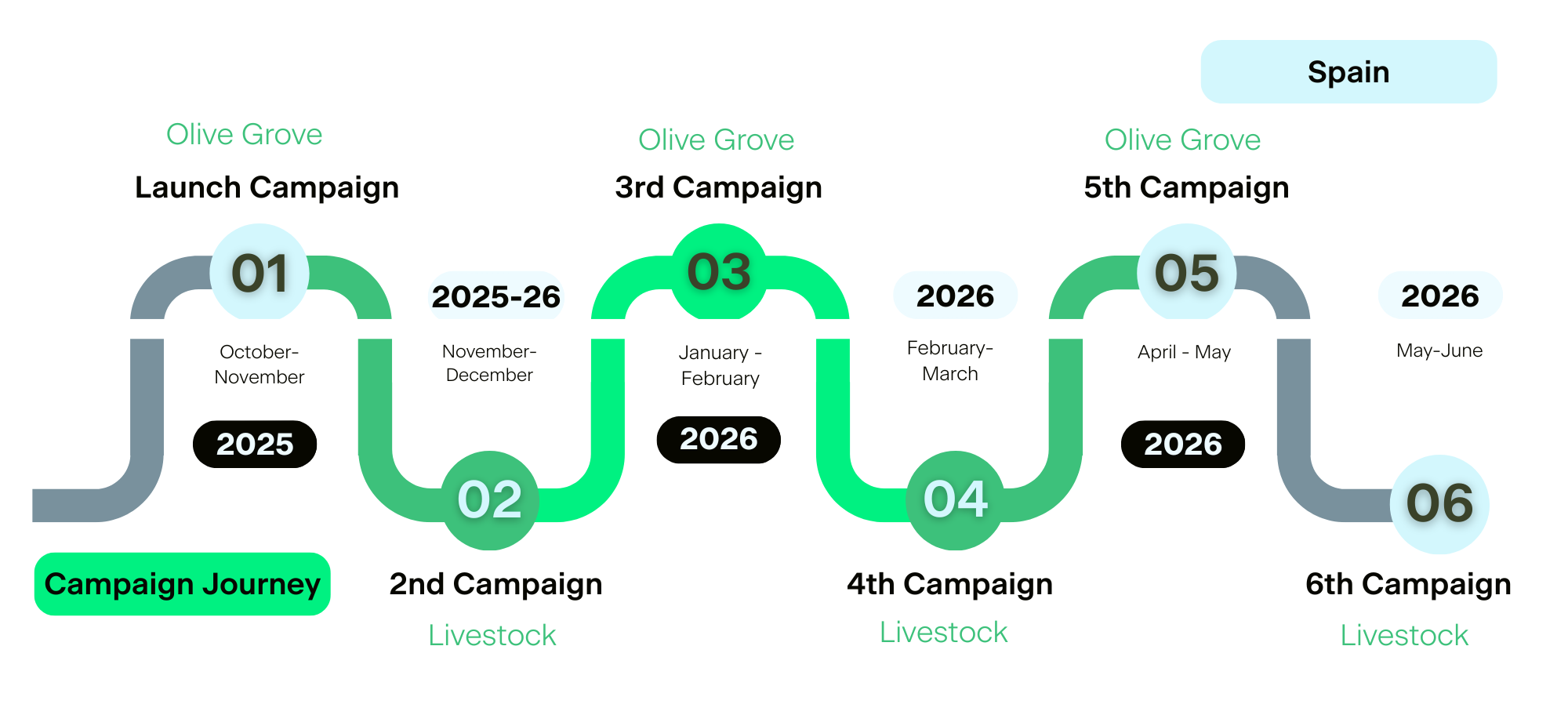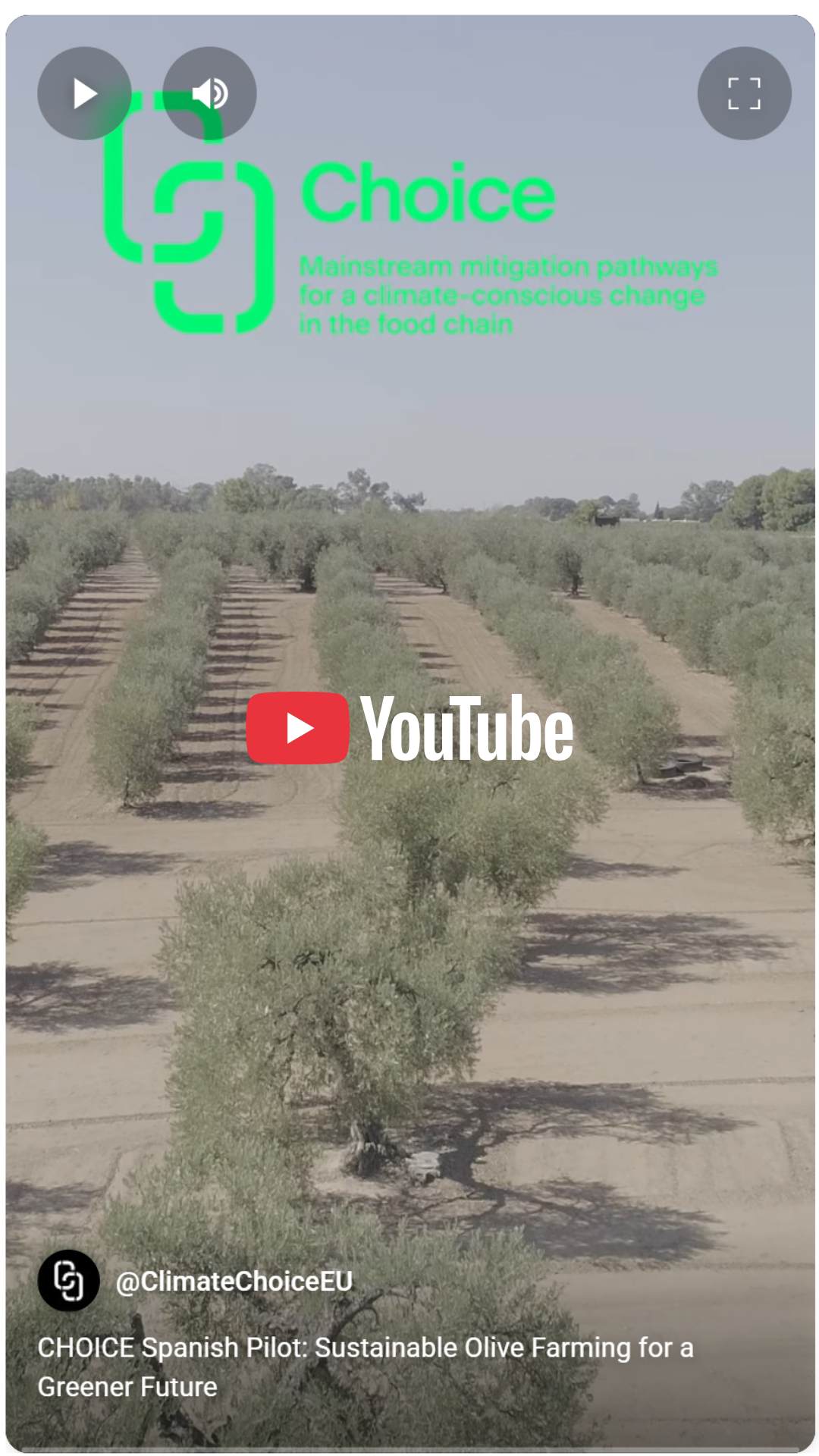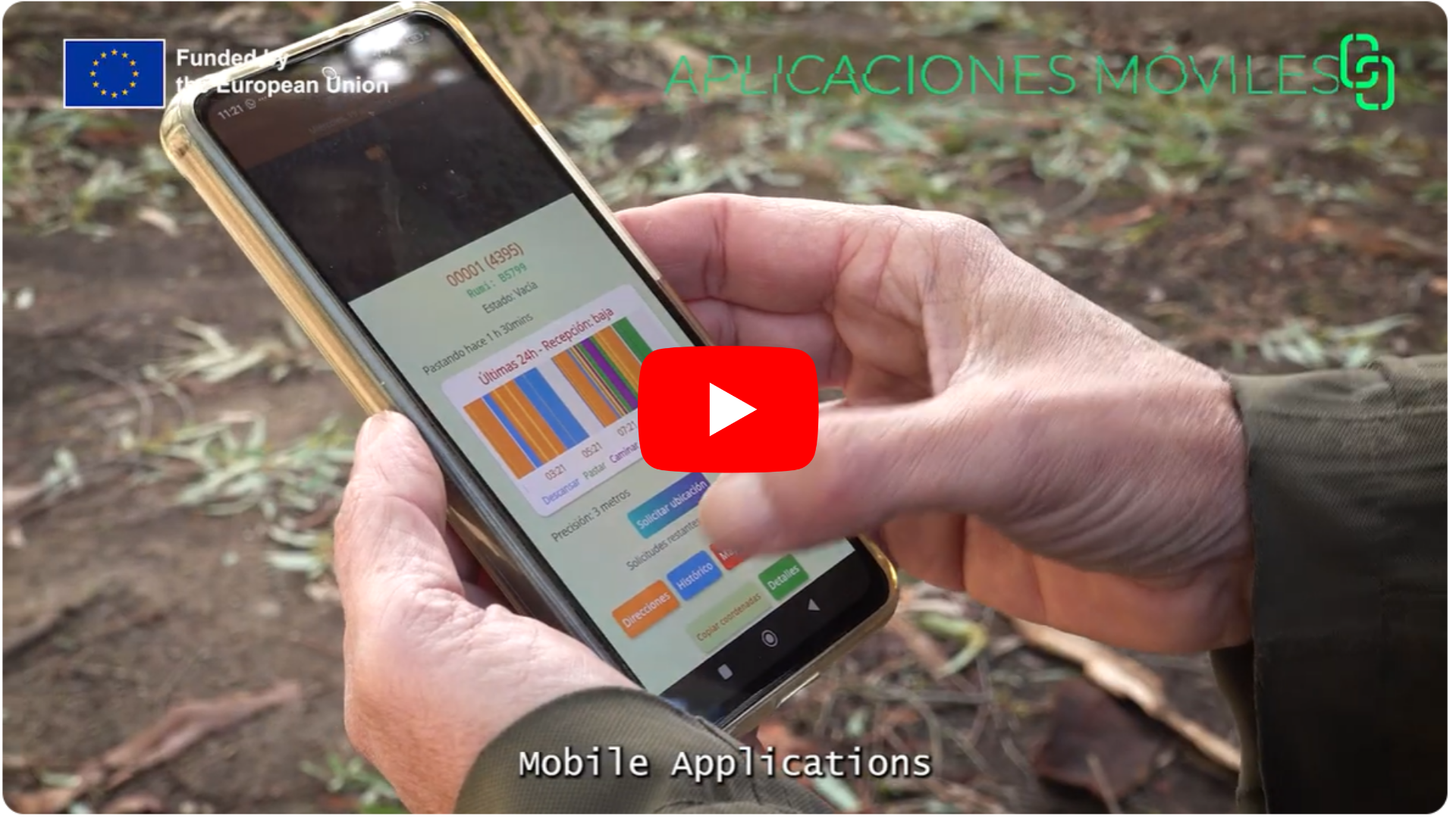Green Farming Practices
Adopting sustainable farming practices for olives and livestock sector
CHOICE pilot activities in Spain
Motivation
Recent statistics reveal a significant increase in Spain's food-related carbon footprint, both in total and per capita terms, from 1960 to 2010. The total carbon footprint from food production to waste management has risen by a factor of 3.9. In per capita terms, this increase is 2.5 times, escalating from 1.5 to 3.6 tons of CO2 per person annually.
Olives are a crucial crop, yielding over 1.5 million tons of olive oil annually, accounting for 79% of Spain's total production and 40% of global output. Nevertheless, the intensification of olive cultivation brings adverse environmental impacts, including soil erosion and contamination, water resource overexploitation, and biodiversity loss due to monoculture practices.
At the same time, Livestock production in Spain is a major source of greenhouse gas emissions, contributing 1.6 tons of CO2 equivalent per capita annually, in contrast to the 0.4 tons emitted by plant-based food production. To transition to more sustainable practices, it's essential to maintain transparency and accurately account for emissions from livestock, including carbon sequestration in grazing systems and emissions from imported livestock products.
Policymakers and scientists are actively working towards strengthening the food system's resilience against climate-related impacts. Through well-crafted policies such as the Common Agricultural Policy, the Paris Agreement (2016), the European Green Pact (2020), and the Methane Production limitations set forth in COP25 (2021), they aim to guide farmers towards more sustainable practices.
Pilot Scope and Activities
Pilot activities in Spain are related to the adoption of these “green farming” practices.
Under the coordination of the CAAND association, comprising over 297,057 farmers and livestock producers and 641 agriculture cooperatives representing in Andalusia, 22% of the cooperatives in Spain, the pilot will involve a large group of olive and livestock farmers. Leveraging this collaborative partnership and the use of the CHOICE IAM modelling framework, improved scenarios that will incorporate the impacts of specific ‘green’ farming practices will be integrated through the FABLE Calculator tool, and also -through the developed soft-links with GLOBIOM- benefitting from related improvements in terms of actor heterogeneity. This will provide a quantified representation of the impacts of the adoption of sustainable farming and livestock practices, analysing, for instance, rotational grazing, regenerative agriculture, bio-fertilisers, use of manure as fertilizer, change feeding modes in ruminants so that decomposition could reduce methane emission. CHOICE behavioural models will capitalise on information from profiling of the farmers (considering, for instance, age, education level, gender, and financial circumstances) and feed this information to the IAMs. Moreover, through digital engagement campaigns involving local farmers and associated capacity-building activities (focus groups, webinars, hands-on sessions), data stories and interventions attempting to mainstream – in non-scientific language – the results of IAMs analysis will further seek to explore and quantify adoption levels and associate them with factors, such as resistance to change, socio-economic profiles etc. The demonstrations and trials will comprise more than 291,000 farmers and 659 agriculture cooperatives, divided into clusters based on their socioeconomic profile and location, aiming to demonstrate the critical importance of atomic choices in production as a part of the wider regional and global community. Furthermore, to reduce the carbon footprint, the pilot campaigns will target generating tangible influence in the livestock production sector, especially beef, pigs, goats and sheep.
Enablers
The following CHOICE enablers will be used to achieve the pilot scope:
- CHOICE IAM models (FABLE, Globiom) through interactive interfaces.
- Behavioural models.
- Data storytelling visuals and narratives.
- Randomised Control Trials framework.
Expected Measurable Outcomes
- Increase the number of farmers that will opt for pro-environmental behaviour using the suggested green farming practices, such as rotational grazing, regenerative agriculture, bio-fertilizers, and effective water management.
- Engage a network of more than 200 local actors with different scenarios of sustainable farming practices, interacting with FABLE calculator interfaces and the GLOBIOM spatially explicit tool for biodiversity and health indices; Measure indicators from their experience regarding usability, trust, and relevance;
- Organise at least three large-scale campaigns and four annual challenges, one per quarter, with CHOICE-related objectives.
Partners Involved
Pilot leader:
![]()
Partners:
![]()
![]()
![]()
![]()

![]()
Campaigns in spain
From Local Action to Global Impact
Find more about the specifics of each pilot campaign that have been performed in the Andalucian Region.
- 01 Campaign 1 - Olive grove
- 02 Campaign 2 - Livestock
- 03 Campaign 3- Olive Grove
- 04 Campaing 4- Livestock
- 05 Campaign 5 -Olive Grove
- 06 Campaign 6- Livestock
Olive groves with a future: more efficient, intelligent olive groves
Overview:
Throughout the three campaigns, we will showcase the best practices in olive groves with the help of the farmers who implement them. They all share a common slogan that serves as a motto capturing the campaigns' value proposition and personality. The campaigns highlight various practices that farmers can adopt to increase the sustainability and profitability of their olive groves. Profitability is considered a key concept across all three campaigns as it is fundamental to the long-term success of farms. In the first campaign, the promoted practices are ground cover and genetic improvement.
In this first campaign, the focus is on precision agriculture and crop monitoring, demonstrating how digitalisation and data-driven farm management can optimise resource use, reduce costs, and improve yields. The economic benefits of adopting these technologies will be illustrated through real examples of farmers successfully using digital tools to make informed decisions.
Objectives:
- Raise awareness among olive growers about the advantages of precision agriculture and digitalisation.
- Promote the use of tools such as drones, sensors, and monitoring systems to optimise water, fertiliser, and energy use.
- Encourage data-based decision-making as a means to improve efficiency and profitability.
- Highlight the link between smart farming practices, sustainability, and economic resilience.
Target Audience:
Olive farmers in the Andalucian Region.
Approach & Activities:
The campaign will take the form of a video, starring and narrated by a farmer who uses precision agriculture and crop monitoring technologies on his own farm. He will recount his positive firsthand experience and demonstrate the good results he has achieved in terms of sustainability and profitability.
There are also plans to produce infographics and data stories to highlight the savings achieved through the implementation of ground cover and/or the introduction of genetically modified varieties.
To support the campaign and maximise its impact and influence among farmers, other complementary activities can be carried out. These could include on-site demonstrations of good practices and technical seminars, where information is provided and technical questions about the implementation of these practices can be answered.
Timeline:
October – November 2025
Location:
The campaign will be posted on the website of Cooperativas Agro-alimentarias de Andalucía to reach different olive growers in the region of Andalusia. It will be disseminated through two specific channels selected for this purpose:
- WhatsApp (through dissemination groups, either our own and those of cooperatives interested in participating) and,
- Email (through email marketing to the campaign's target audience).
Expected Impact:
- Increase in the number of farmers adopting precision agriculture and digital monitoring tools.
- Increased sustainability of the olive sector.
- Higher profitability for Andalusian olive growers.
Read the campaign factsheet (link)
Join the Campaign!
Do you want to make your livestock farming more profitable? Go digital
Overview:
In this first campaign targeting the livestock sector, Juan Ignacio Fontán, who has dedicated his entire life to the countryside, recounts how the sector has undergone an enormous transformation: today, digitization allows us to work better, with less effort and with a positive impact on the environment. In semi-arid areas, where water is a critical resource, technology makes all the difference. Sensors in tanks, solar-powered networks, and mobile apps allow real-time monitoring of water, ensuring that animals always have access to it.
Drones have also become a revolutionary tool. They help locate livestock, guide them like a sheepdog, check facilities, and monitor water points. Also, GPS and accelerometers in collars can show where each animal is, what it is doing, and how it is behaving. This helps to manage the animals more precisely and responsibly.
All these technologies contribute to more efficient, productive, and sustainable livestock farming, capable of keeping alive an economic model that provides enormous ecological and social benefits.
Objectives:
- Promote the digitization of extensive livestock farming, demonstrating how technology improves efficiency and facilitates daily work.
- Highlight technological solutions applied to water and livestock control (sensors, GPS, drones), emphasizing their practical usefulness.
- Promote more sustainable and responsible management, optimizing resources and reducing environmental impact.
- Show real-life examples of innovation, such as the DEMOFARM project, to build trust and inspire other farmers.
- Motivate the sector to adopt these tools, reinforcing the idea that modernization is necessary and accessible.
Target Audience:
Livestock farmers from the Andalusian region.
Approach & Activities:
The campaign consists of a video starring and narrated by a livestock farmer who uses digital technologies on his own farm. In it, he recounts his positive first-hand experience and shows the benefits these technologies bring him.
In addition, a form is included so that anyone interested in learning more about these technologies, as well as the procedure for implementing them, can contact us directly.
Timeline:
November – December 2025
Location:
The campaign will be posted on the website of Cooperativas Agro-alimentarias de Andalucía to reach different livestock farmers. It will be disseminated through two specific channels selected for this purpose: WhatsApp (through dissemination groups, either our own and those of cooperatives interested in participating) and email (through email marketing to the campaign's target audience).
Expected Impact:
- Greater adoption of digital technologies in livestock farms, driving real modernization of the sector.
- Increased efficiency and sustainability, thanks to better control of water, livestock, and available resources.
- Change in perception of extensive livestock farming, positioning it as an innovative, professional activity aligned with environmental conservation.
- Increased interest and commitment from the sector upon seeing practical examples and concrete benefits, generating a multiplier effect in the region.
Watch the video and join the campaign!

